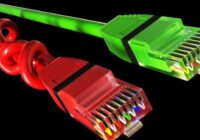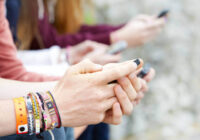Internet access has long been recognized as essential to breaking down the digital divide that separates the global haves and have-nots.
According to some, the promise of the so-called fourth industrial revolution in Africa is nearly boundless. With smartphone usage and internet access on the rise, Africans can now access a slew of new, game-changing services, from mobile banking to digitized record keeping to the ability to deliver medicine by drone.
However, there’s a dark side to this story. According to a new report from the Broadband Commission for Sustainable Development, established by the UN Educational, Scientific and Cultural Organization (UNESCO) and the International Telecommunication Union (ITU), broadband internet remains completely inaccessible for billions of people living in the developing world. This includes 90% of those living in the 48 UN-designated Least Developed Countries (LDCs). Overall, 57% of the world’s population are still offline and unable to reap the vast economic and social benefits of the internet.
Digital Divide
The problem is particularly acute in sub-Saharan Africa, with internet available to less than 2% of the populations in Burundi, Eritrea, Guinea and Somalia. To make matters even worse, a concurrent report from the Collaboration on International ICT Policy for East and Southern Africa (CIPESA) says that despite technological breakthroughs, internet blackouts have become even more common in Africa since 2015, with governments either completely shutting down the internet or blocking access to certain platforms like Facebook, Twitter and WhatsApp.
The reports highlight how internet connectivity is a key — and often ignored — ingredient when it comes to achieving the UN Sustainable Development Goals (SDGs). With the lowest levels of internet access mostly found in sub-Saharan Africa, policymakers must put not only stalwarts like FDI and health care but also telecoms at the heart of their development strategies, working with global partners like UNESCO and CIPESA. With elections coming up at UNESCO, it will be a make-or-break opportunity for the new director general to steer the way towards achieving SDG 9 before 2030.
With nine nominations received for the post of director general, the UNESCO race is in full swing. However, most of the candidates raise serious issues as they hail from countries that rely heavily on internet censorship, such as Azerbaijan, Qatar, Egypt and China, making them fundamentally ill-placed to lead efforts to achieve universal digital access. It’s no small wonder why the former French minister of culture and communication, Audrey Azoulay — who started her career in the audiovisual and telecommunications sector — is tipped to win the October poll. She is a keen advocate of freedom of expression and has spoken in favor of supporting the new digital media wave as a way of expanding access to information.
Indeed, broadband access has long been recognized as essential to breaking down the digital divide that separates the global haves and have-nots. Unfortunately, especially given increasing government censorship in Africa, this digital divide runs the risk of creating a global two-tiered system, where those with connectivity can access digital services and develop more quickly than those without. As the Broadband Commission for Sustainable Development underlined, internet connectivity is closely intertwined with all of the SDGs. In health care, for instance, broadband access is a critical way to manage and exchange information, especially during times of crisis such as the Ebola epidemic.
In the eyes of some governments, however, the internet represents not a catalyst for economic development but a source of dissent to be squashed. In 2016 alone, a total of 11 countries blocked internet access — before elections in Uganda, during anti-government demonstrations in Ethiopia and national testing in Algeria. This past year, the government of Togo shut down the internet as citizens protested against the president, and Cameroon imposed a blackout for more than three months in certain regions. These disruptions don’t only represent material losses, but they lead to an irreparable loss of human dignity, knowledge and freedom of expression.
Obstacles to Overcome
Faced with both patchy access and active government censorship, African civil society groups, institutions and international stakeholders must work together to help break down the digital divide. Earlier this year, Afrinic, the regional internet registry, made a proposal to punish governments that shut down broadband access by declining to grant them new IP addresses for a given period of time. However, this suggestion was quickly snuffed out by the registry’s management.
To make real progress, regional and world leaders must coordinate with the ITU, UNESCO, CIPESA, as well as with the Alliance for Affordable Internet, to expand broadband access. Many of these collaborators have already made viable suggestions for addressing the issue. For instance, the most recent State of Broadband report has highlighted the high cost of internet access in landlocked African countries as one of the main obstacles to overcome. The report highlights rare successes in states like Rwanda, which has prioritized investment in ITC, rolled out a national high-speed internet network, partnering with Korea Telecom to extend a 4G LTE network countrywide.
Unfortunately, UNESCO — which co-authored the State of Broadband report and could have acted as a main partner for African governments eager to expand access — has fallen short of that mission. The agency lost nearly a quarter of its funding in 2011 when the US cut off funding in response to the organization’s decision to recognize Palestine as a member state. Since then, it has become further mired in political controversy not just over the Israel-Palestine conflict but also on issues like the commemoration of the Nanjing Massacre. Most recently, the director general herself has been implicated in another scandal — the Azerbaijani laundromat — as her husband was found to have received nearly half a million euros from one of the companies cited in reports. The leadership contest couldn’t have come at a better moment.
Combined with concerted efforts on the part of African governments and other stakeholders, eventually, the continent might well reap the benefit of the fourth industrial revolution and meet its full potential.
The views expressed in this article are the author’s own and do not necessarily reflect Fair Observer’s editorial policy.
Photo Credit: Ollyy / Shutterstock.com
Support Fair Observer
We rely on your support for our independence, diversity and quality.
For more than 10 years, Fair Observer has been free, fair and independent. No billionaire owns us, no advertisers control us. We are a reader-supported nonprofit. Unlike many other publications, we keep our content free for readers regardless of where they live or whether they can afford to pay. We have no paywalls and no ads.
In the post-truth era of fake news, echo chambers and filter bubbles, we publish a plurality of perspectives from around the world. Anyone can publish with us, but everyone goes through a rigorous editorial process. So, you get fact-checked, well-reasoned content instead of noise.
We publish 2,500+ voices from 90+ countries. We also conduct education and training programs
on subjects ranging from digital media and journalism to writing and critical thinking. This
doesn’t come cheap. Servers, editors, trainers and web developers cost
money.
Please consider supporting us on a regular basis as a recurring donor or a
sustaining member.
Will you support FO’s journalism?
We rely on your support for our independence, diversity and quality.







